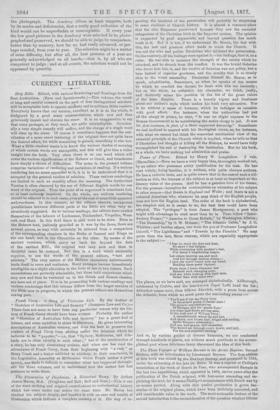Poems of Places. Edited by Henry W. Longfellow. 2 vols..
(Macmillan.)—Here we have a very happy idea, thoroughly worked out,. by an editor who possesses every qualification for his task. He has- read widely, being familiar, it is evident, with quite obscure authors. He has a catholic taste, and is quite aware that in the case of such a col- lection as this, the interest of the subject is at least as important as the literary value of the poems. And lee has a genuine love of his theme.. For the present—hereafter he contemplates an extension of his subject to other scenes—that theme is England and Wales ; and there is not a cultured American who, whatever he may think of the English people, does not love the English land. The order of the book is alphabetical,. the simplest and, as it seems to us, the best that could have been adopted. The "prologue" is from James Montgomery, a poet who might with advantage be read more than he is. Then follow "Intro- ductory Poems ;" "America to Great Britain," by Washington Allston ; "The Steamship," by 0. W. Holmes; "The Atlantic Cable," by J. G. Whittier ; and besides others, two from the pen of Professor Longfellow himself, "The Lighthouse" and "Travels by the Fireside." We may quote from the last, three stanzas, which are especially appropriate to the subject :—
I fear no more the duet and heat, No more I feel fatigue, While journeying with another's feet, O'er many a lengthening league. Let others traverse sea and land, And toil through various climes,— I turn the world round with my hand, Beading these poets' rhymes. From them I learn whatever lies Beneath each changing zone,
And see, when looking with their eyes, Better than with mine owns' The places, as we have said, are arranged alphabetically. Aldborough, celebrated by Crabbo, and the loss-known Cspel Lofft bead the list ; Aldershot comes next, then follows Alnwick, with a poem from across the Atlantic, from which we must quote the concluding stanza :— e You'll ask if yet the Percy lives In the armed pompt,oagfteifvneetualedaRl astteato Ties prtoestsepuutrreigdesheins
Are some half-dozen serving-men, In the drab coat of William Penn ; A chambermaid, whose lip and eye,
And Cheek, and brown hair, bright and curling,
Spoke Nature's mistoorttey ; And one, half-groom, half-seneschal,
Who bowed me through court, bower, and ban, For ten-and-sixpence sterling."
And so, by various guides of diverse burnouse, we are conducted through hundreds of places, not without much gratitude to the accom- plished poet whose felicitous fancy discovered the idea of this book.


































 Previous page
Previous page